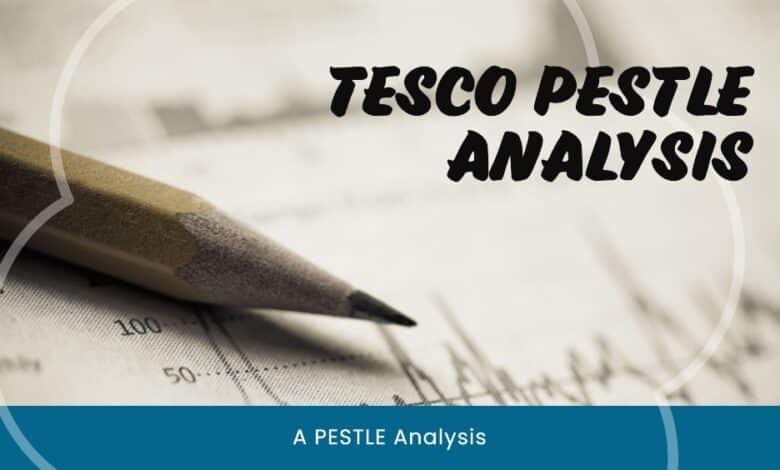Tesco PESTLE Analysis

Tesco’s strategic decisions, informed by a thorough PESTLE analysis encompassing political, economic, sociocultural, technological, legal, and environmental factors, position the supermarket giant to navigate diverse global markets successfully.
Imagine walking into a store where you can find everything you need, from fresh fruits and vegetables to electronics. That’s what it’s like to shop at Tesco. Tesco is a big supermarket chain that has stores in many parts of the world. But have you ever wondered what affects how Tesco does business?
PESTLE Analysis of Tesco
That’s where a PESTLE analysis comes in. It looks at political, economic, sociocultural, technological, legal, and environmental factors that might affect Tesco. Let’s dive in and learn more about these factors and how they impact Tesco.
Political Factors
Tesco, a well-known supermarket chain, operates in many countries. Because of this, it has to follow the rules set by different governments. These rules can change depending on who is in charge.
For example, a government might decide to change tax laws, which could affect how much money Tesco makes. Also, if a country is not stable and there are lots of changes happening, it could be risky for Tesco to have stores there.
Lastly, trade regulations and tariffs can affect how Tesco does business with other countries. So, Tesco always has to keep an eye on the political situation in the places where it operates.
Economic Factors
Just like any other business, Tesco’s performance is influenced by the economy. If the economy is doing well, people will have more money to spend, and they might buy more from Tesco.
But if the economy is not doing well, people might cut back on their spending. Changes in inflation and exchange rates can also affect Tesco’s costs and prices.
For example, if inflation is high, the cost of goods might go up. Or if the exchange rate changes, it could affect the cost of importing goods from other countries. Lastly, unemployment rates and consumer spending habits can impact Tesco’s sales. So, Tesco needs to keep a close eye on these economic factors.
Sociocultural Factors
Sociocultural factors are all about the people who shop at Tesco. People’s tastes can change over time. For example, these days, many people are interested in buying organic or vegan food.
If Tesco doesn’t offer these options, customers might decide to shop somewhere else. Also, as the population changes, Tesco needs to make sure it’s meeting the needs of all its customers.
For example, in an area with a lot of young families, Tesco might want to offer more baby and child products. Lastly, cultural trends can affect what products are popular. So, Tesco needs to stay up-to-date with the latest trends to keep its customers happy.
Technological Factors
Technology plays a big role in how Tesco runs its business. New technologies can help Tesco serve its customers better. For example, Tesco can use technology to keep track of what products are selling well. Or it can use technology to make shopping more convenient for customers, like offering online shopping or self-checkout machines.
But technology can also be a challenge. For example, Tesco needs to make sure its computer systems are secure so that customers’ personal information is safe. Also, as more people shop online, Tesco needs to make sure its website and mobile app are easy to use. So, staying up-to-date with the latest technology is very important for Tesco.
Legal Factors
Every country has laws that businesses need to follow, and Tesco is no exception. There are laws about how food should be labeled, how workers should be treated, and many other things. Tesco needs to make sure it’s following all these laws. If it doesn’t, it could get into trouble.
For example, it might have to pay a fine or get bad publicity. Also, laws can change over time. So, Tesco needs to keep up-to-date with the latest legal changes to make sure it’s doing everything right.
Environmental Factors
The environment is a big concern for many people these days, and Tesco is no exception. Tesco needs to think about how its business affects the environment. For example, it needs to think about how much waste it produces and what it does with that waste.
It also needs to think about how it uses energy and whether it can use more renewable energy. Plus, Tesco sells a lot of products that come from nature, like fish and palm oil. It needs to make sure these products are sourced in a way that doesn’t harm the environment.
Tesco has already started working on these issues. For example, it has made commitments to reduce its carbon emissions and waste. But there’s always more that can be done.
Conclusion
Tesco’s success is influenced by various factors analyzed through a PESTLE framework. Political, economic, sociocultural, technological, legal, and environmental aspects shape its business strategies.
Adapting to government regulations, economic trends, changing consumer preferences, technological advancements, legal requirements, and environmental considerations is crucial for Tesco’s sustained success.
The company’s proactive environmental commitments showcase its responsibility, but ongoing vigilance and adaptation to these factors remain essential for navigating the dynamic retail landscape.







